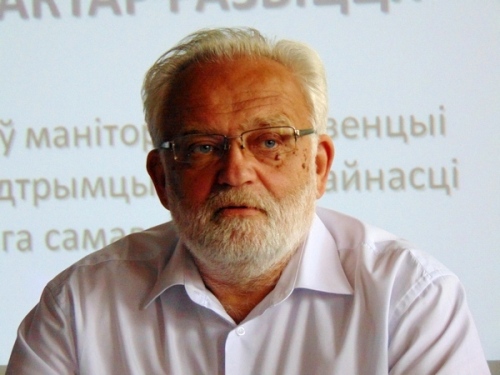Poland and Germany were both initiators and drivers of a New Eastern policy linked to the Eastern neighborhood and Russia/Soviet Union.
Uladzimir Matskevich: I never had a gun so I have nothing to snatch when I hear the word “culture"

If you neglect planted cultures soil gets full of weeds, thought the Romans, who introduced the term culture. Philosopher tells what conditions are needed for a delicate Belarusan “garden” to blossom.
A target for criticism and a subject for discussion among the experts were the results of the monitoring “Culture as the factor of development”, the presentation of which took place recently in Minsk. Let us recall that the Center for European Transformation (CET) organized and presented joint research. Scientists were finding out how the realization of the UNESCO Convention “On protection and support of the diversity of forms of cultural self-determination” is being realized in Minsk.
The results of the research are not very optimistic: images about the culture differ a lot in the eyes of the Belarusan state and UNESCO. General level of our culture regarding the norms of the Convention is low. Few positive shifts and potential directions are not built in the system. I.e. there is no special strategy for development of culture.
We should note that after the public discussion, criticism, and upgrading of the monitoring CET is planning to propose this model for a broader application among the Eastern Partnership countries. Scientists believe that it will enable the organization of simultaneous research and “mild management” of the countries’ cultures through coordination work.
Time will show how vital will be the elaborated model. And for now his opinion regarding the results of the monitoring and his view on culture shares Uladzimir Matskevich, the head of the Board of the International Consortium “EuroBelarus”, philosopher and methodologist.
“I call the sphere I’m working in a “cultural policy”, though it hardly says anything about the policy in the sphere of culture in official, state, and international institutions that take upon themselves the responsibility to work with culture or somehow influence it. In this sense I formulated a maxima for me: I never had a gun so I have nothing to snatch up when I hear the word “culture”. And I have to snatch up my head.
Unfortunately, the delicate world of culture poorly stands intrusion and influence on it and requires gentle approach. Any tough steps might cause such waves that no one will know how to deal with, and economy, politic, and culturology have much more coarse ways of affecting the culture than it can stand.
Andrei Yahorau told that it was only in the past few centuries that state establishments such as ministries of culture appeared in Europe, whereas before that culture was the issue of the Soviet Union with the “industrialization, collectivization, and cultural revolution”. Since one of the tasks of the Soviet authorities was to educate new person, culture was viewed as a direction, weapons, and influencing mechanism for forming this new person.
And the most principal question to all this is whether we should just leave the culture alone, just as in case of Adam Smith’s liberal economic model.
And this might be applied to culture rather than to economy. But if the state takes culture very seriously, there is no way back, unfortunately.
When we are concerned with the culture as the personalized value we cannot just say “make it easier for us, stop ruling it!” It won’t happen so. We should become the participants of this rule; otherwise nothing good will happen.
Today Belarusan problematics concerns the interests of people who are most distant from cultural management. And when the discussion about tendentiousness and narrowness of the monitoring started, it reminded of the usual Belarusan situation: when discriminated minority shares its viewpoint it meets objections even from the most loyal and objective people.
But how can the minority not be tendentious? If one doesn’t want it to be such, there should be a place for minorities in concepts, programs, and strategies. But if there is no such place, minorities will be tendentious and oppositional.
I want to emphasize one more thing from my perspective as a methodologist and cultural politician, for whom cultural policy is a form of modern existence of the methodology and philosophy. The word “culture” comes from the Romans, not the Greek. They were first to use this term because of a particular attitude towards plants: culture is something specifically selected, since if you neglect planted cultures soil gets full of weeds.
Very archaic Romans invented it, and their invention became a part of civilization. And later, at the last stage of the Roman imperia development, a different understanding of culture appeared. Romans, who were at the top of the world civilizations, were spreading their political power and culture to the conquered territories and conquered peoples. But the peoples didn’t want to take that, and some of them fight for the traditional values with arms in their hands. They have different cultures.
And one more thing: culture can have plural forms — cultures that differ from each other and are, according to Akudovich, in a permanent state of war. Culture is something that is fighting against something external and different. And in this sense we don’t have instruments today that would catch this feature of culture to oppose something different and preserve authenticity.
We can compare the state of Belarusan culture with our European and Asian countries-neighbors: we have fewer theaters per person, cinema is neglected, and there are few galleries — lack of everything in comparison with what is counted by different international standards. But look: from long ago we are opposing different external directions. Despite lacking behind by number of things we can be proud of, we, Belarusans, still oppose innovations (they are not always good).
This peculiarity to oppose should also be counted somehow, since this is something very peculiar to us. That is why I, for example, have no answer to the question whether our culture is better than the culture of our neighbors or is it worse?
To look at everything realistically, we shouldn’t deny that state institutions and scientists are talking about culture, but it is impossible to ignore what independent researchers say. The latter create and use culture, so their opinions should be taken into account more than those of the cultural professors.
As to the assessment of monitoring: we shouldn’t grieve over not having or losing something. We got to realize: if innovations don’t take roots there, it indicates that something different is cultivated there. And it is not always conscious. Since neither villagers (who are culture media) nor city dwellers (who are media of different culture) are experts. They are not obliged to conceptualize something that their cultural background consists of.
Only a person from outside can do that. But when observers don’t have certain conceptual schemes in order to grasp that, it remains unknown both for the culture medium and for the external foreign observer a well as for the scientist, who borrows images about Belarusan culture from fashion trends of today’s civilization.
It is for a reason that in some countries culturology as a field for understanding culture is forbidden, while in others it is cultivated. So far, sciences about culture that we have are at the stage of collecting butterflies.”
Others
-
Uladzimir Matskevich: The sooner the "Union State" is denounced, the better for Belarus
Not only does the “Union State” undermine the establishment of civilized relations with Europe, but it hinders the possibility of normal relations between Belarus and Russia.
-
Uladzimir Matskevich: The regime can no longer control the situation in the country
The authorities are unable to prolong the social contract with the people: there is no way out of the social crisis.
-
Press release of the BNP in connection with the next round of the dialogue in the format of the EU-Belarus Coordination Group
Belarusan National Platform of the Eastern Partnership Civil Society Forum welcomes the dialogue process in the format of the EU-Belarus Coordination Group, the third round of which was held in Minsk on 3-4 April 2017.
-
Hennadiy Maksak: Europe must react adequately to the events in Minsk
A new wave of political repressions should make the EU return to tougher policy towards the Belarusan regime.








Comments
From farewell to a new Eastern policy and towards a new development
Poland and Germany were both initiators and drivers of a New Eastern policy linked to the Eastern neighborhood and Russia/Soviet Union.